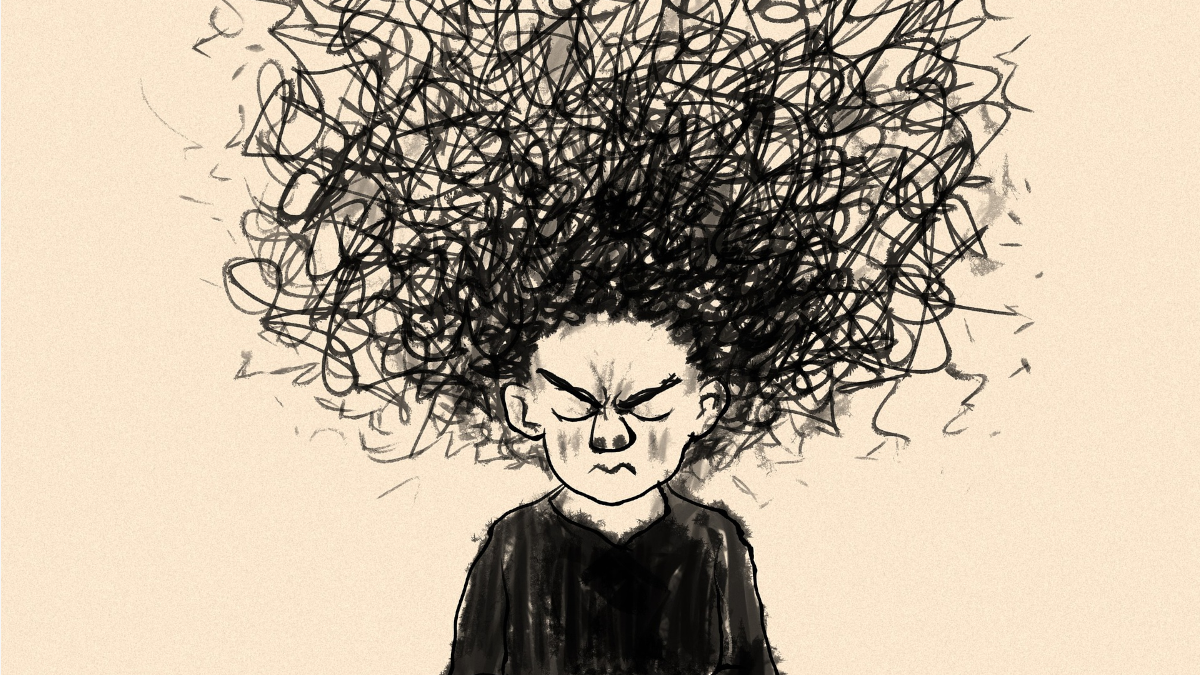I’m a classic thinker or, “overthinker” as my family and friends call it. I’m guilty of thinking things to death.
I replay conversations over and over again in my mind. I obsess about decisions I’ve made, and I often find myself lost in a sea of imaginary “what if” scenarios.
Are you the same?
While thinking can help you shape new ideas, make informed decisions, and see alternative viewpoints, too much of it can also destroy your confidence, muddle your brain, cause anxiety, and even prevent you from reaching your full potential.
But when does thinking become overthinking? Why do we do it? How do we know we’re doing it? And how do we stop ourselves from spiraling down into the deep, dark hole of irrational thought?
Let’s find out as we go through:
- Why overthinking is bad for you
- 7 signs you’re probably overthinking it
- What makes us overthink?
- How can we stop overthinking?
Time to stop thinking and start reading!
Why overthinking is bad for you
Overthinking affects 73% of us. But what do we actually mean by overthinking? How is it different from just thinking? And when does healthy harmless thinking turn into dark, de-habilitating overthinking?
Thinking vs overthinking
This might be stating the obvious, but to understand the differences between thinking and overthinking, we need to be clear on what we class as thinking.
“Thinking is the ultimate cognitive activity, consciously using our brains to make sense of the world around us and decide how to respond to it.”
Changing Minds, What is Thinking?

From the minute we wake up to the moment we go to sleep, our minds are engaged in thinking.
We process thoughts to make sense of our surroundings, solve problems, ask questions, complete tasks, and make decisions.
These thoughts can be grouped into three categories:
Insightful thoughts: Which help you solve problems, ask questions, and make decisions.
Experiential thoughts: Which help you make sense of your surroundings, and focus your attention on the present so you can complete tasks.
Incessant chatter: Which helps you with…absolutely nothing. It’s those useless, banal thoughts that infiltrate your mind and cycle round, and round, and round and is more commonly known as….overthinking.
Incessant chatter, or overthinking, is incredibly detrimental to your wellbeing because it focuses on things that are problematic, stressful, or worrisome to you. Things like what others think, pain (real or imaginary), what might happen in the future, what happened in the past, or long-term frustrations.
Let’s explore this more in the next bit.
Why is overthinking so bad for us?
(Source)
Overthinking is totally useless. It’s an unproductive exercise that serves you no purpose.
It can make you feel stressed, depressed, and anxious and it can take up precious space in your mind, stopping you from processing the insightful and experiential thoughts which allow you to live a healthy and functional life.
“Overthinking is characteristically unproductive, and what’s worse, it can lead to rumination or obsessive thinking.”
The Zoe Report, What Causes Overthinking? Therapists & Psychologists Break Down This Bad Habit
Let’s take a closer look at how overthinking can damage you, your life, and your wellbeing.
Overthinking stops you from functioning
Overthinking takes-over your rational insightful and experiential thoughts and creates too many options, choices, and scenarios for you to process. This stops you from completing tasks and solving problems and leaves you unable to make even the simplest of decisions.
I can’t tell you how many times I’ve been stuck in a shop unable to choose a chocolate bar, until the embarrassment and frustration of not being able to make a decision forces me to leave, chocolate-bar-less.
Overthinking blocks creativity
Overthinking is exhausting. It’s a constant whirlwind of circling, dead-end thoughts that can leave you feeling drained and stuck in a mental rut. This stems the flow of creativity and stops you from coming up with new ideas and solutions.
Overthinking keeps you awake at night
A good night’s sleep is a rarity for overthinkers. Sleep happens when your mind is calm and your heart rate is low. But overthinking keeps the brain awake, ticking through thoughts, falling down never-ending rabbit holes, and getting tangled up in a web of what-ifs.
Overthinking makes you irrational
This is the worst offender. I know I’m being silly! I know I shouldn’t get upset! And I know I need to get over it, but overthinking keeps me locked in a stubborn strop for longer than I should be.
So we know what overthinking is and we know why it’s so bad for us, but how do we know when we’re doing it?
7 signs you’re probably overthinking it

Two in five people overthink something at least once a day. Are you one of them? How can you tell if you’re problem-solving or if you’re overthinking?
Here are seven tell-tale symptoms of an overthinker. Do they sound familiar?
- You relive moments or conversations in your head, repeatedly
2. You find it hard to sleep because your brain won’t switch off
3. You constantly play out ‘’what if..” scenarios in your mind
4. You always read way too much into what people say (or don’t say!) and how they say it
5. You find it difficult to stop thinking about the mistakes you’ve made
6. You dwell on the past
7. You worry about stuff that hasn’t happened, might never happen, and that you have no control over
So, you’re an overthinker, just like me: Welcome to the club! But, if you’re also like me, you’ll be wondering why on earth you do it?
What makes us overthink?
“Overthinking is very common and may be caused by self-doubt; self-esteem issues; concern about repeating past patterns in relation to prior bad experiences; traumatic experiences; or anxiety”
My Domaine, The Psychology Behind Chronic Overthinking (and How to Stop It)
Although most of us will suffer from overthinking at some point in our lives, it’s believed that some of us are more prone to it than others.
People that are naturally competitive, ambitious, and intense are far more likely to incessantly regurgitate and obsess over thoughts than those that are calmer, less frantic, and non-reactive.
But some also say that overthinking is triggered by stress and comes from a natural instinct to remain in control. We tend to cycle through thoughts so we can prepare for and deal with whatever life throws at us.

We overthink to alleviate the fear of what might happen. For instance (and I’m embarrassed to say that this is real), when I’m under pressure or stress I sometimes find myself trapped in an endless cycle of ‘what if’ scenarios.
For example, what would happen if I were to lose an arm, or catch a crippling illness, or became homeless? What would my life be like? How would I work? What would happen to my dog? My house? My relationship?
This repetitive cycle of negative thoughts sometimes gets me so worked up, I fly into a panic about the worst-case scenarios and I end up feeling completely hopeless.
It sounds insane, doesn’t it?! It’s such a stupid and irrational thing to do, but it’s clearly a way of dealing with stress. I’m trying to dilute the stress I’m under by thinking about something worse. Something more stressful, something that truly scares me.
But while there’s nothing wrong with ‘preparing for the worst’, there is something wrong with worrying about stuff that hasn’t happened yet, and may never even happen!
But, regardless of what makes us overthink, the scary thing is, we’re not in control of any of it.
Our thoughts are uncontrollable.
For instance, if I tell you not to think about a big red bear, I bet a big red bear is all you can now think about, right?

Does that mean there’s no hope for us over-thinkers? Are we trapped in a hellish cycle of incessant overthinking?
How can we stop overthinking?
“Your brain produces thoughts, as a biological function, to serve you. And discovering that each of those types of thoughts happens in completely separate brain regions means that we can be trained to use one type more than the other.”
Medium, 3 Types of Thinking — One of Which Is The Root of All Suffering
Although we can’t control what we think, there are loads of things we can do to put our minds elsewhere and stop the cycle of negative thoughts from swallowing us up, whole.
When we recognize that we’re entering a cycle of overthinking, we can refocus our brains to think about something else.
How?
Well, let’s find out! Starting with my own favorite, tried and tested method:
Method #1: Overcome overthinking with…running
Ok. I know running isn’t everyone’s cup of tea, but it is a proven way to lower stress which, as we’ve established, can cause overthinking.
Running, or any form of exercise, trains your brain to take your stress hormones and use them to fuel your activity rather than your mind. This leaves you feeling calmer because you’re focusing on the exercise instead of your thoughts.

I’ve come to rely on my daily runs because I can physically feel how much it helps me cope with stress and pressure. When I run, I completely switch off. My mind goes blank, and I’m completely focused on the present. All I think about is where I’m going.
When I get home, all breathless and sweaty, I feel lighter, calmer, clearer, and happier and whatever I had whirring around in my mind has either gone, or I’ve resolved it, without thinking.
Running for me is like a form of mediation. Which, coincidentally, leads me to my next method…
Method #2: Overcome overthinking with…meditation
If running isn’t for you, then maybe mediation is. With meditation, your sole focus is on your breathing. This intense concentration on breathing lowers your heart rate, slows you down, and puts you firmly in the moment. There’s no room to think about the past, the future, or the what-ifs. All you think about is breathing.

I’ll be honest, I’ve tried mediation to combat my overthinking but I struggle with it. I find complete silence uncomfortable and I lack the discipline needed to sit still and focus. I will keep trying though as I can see the benefits that it can offer an overthinking mind like mine.
If you’re the same and you hate running, try this next method…
Method #3: Overcome overthinking with…writing
I don’t mean writing writing, I just mean writing your thoughts, feelings, and worries down.

Try creating a list of everything that’s worrying you or that you have to do, like a to-do-list. It’s incredibly therapeutic and it allows you to dump all the negative junk that spins around in a recurring loop inside your head, onto a piece of paper, and out of your mind. When something’s written down, the enormity of it disappears. It feels like you’re handing it over or sharing the burden with someone else and it allows you to see a clear path through. You’ll be amazed at how much lighter this small, old-school way of clearing your mind makes you feel.
Method #4: Overcome overthinking with…processes

Creating a process for recurring tasks works wonders for your mind. As I’m a writer for Process Street, a business process management software company, I’m probably slightly biased about the benefits of processes! But honestly, hand-on-heart, it works.
When I first started this job (find out the gory details about that, here) I was a bag of nerves and my overthinking was in overdrive. It didn’t help that this was my first remote working job and I was unsure how I’d be able to communicate with my team who were spread out, across the globe!
What if everyone thinks I’m a rubbish writer?
Did I respond to that message in the right way?
Oh god. I stumbled over my words in my first meeting!
But what if everyone thinks I’m a rubbish writer?!
Oh god. I can’t believe I stumbled over my words in my first meeting!
DID I respond to that message in the right way?
Oh GOD!! No! I stumbled over my words in my first meeting!
You know. That type of thing.
But, when it came to writing my first blog post, I had a set process to follow. So, rather than spinning out about the standard of my work, what people might think, and if it was good enough, I knew it was ok because I’d followed the process.
Do you see? Having a process to follow stopped me from having to think (read: overthink) and it allowed me to focus on getting the job done.
Time to wrap this up
There are lots of other ways to curb overthinking, but these are four methods that I’ve tried and succeeded with (well, apart from meditation, but that’s a work-in-progress!) so I hope they help.
Do you suffer from overthinking? What are your tips for overcoming your mind’s incessant chatter?


